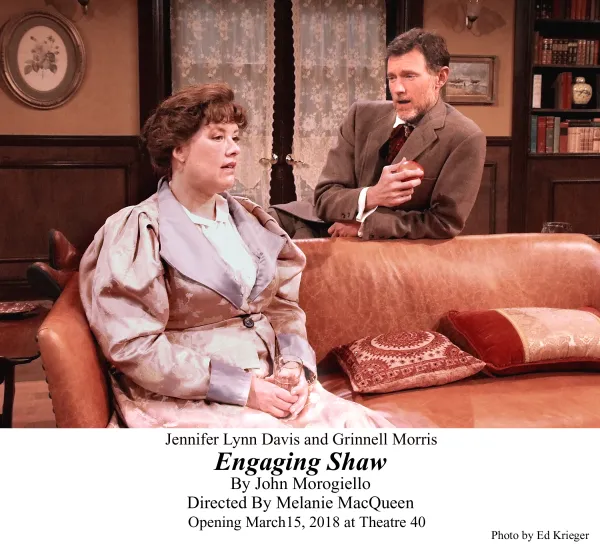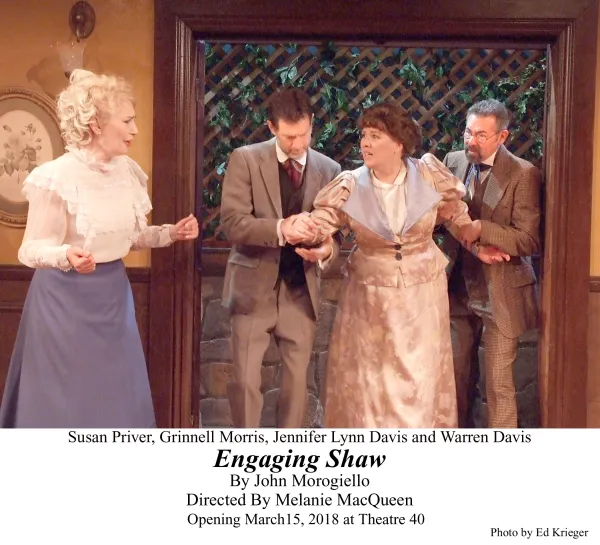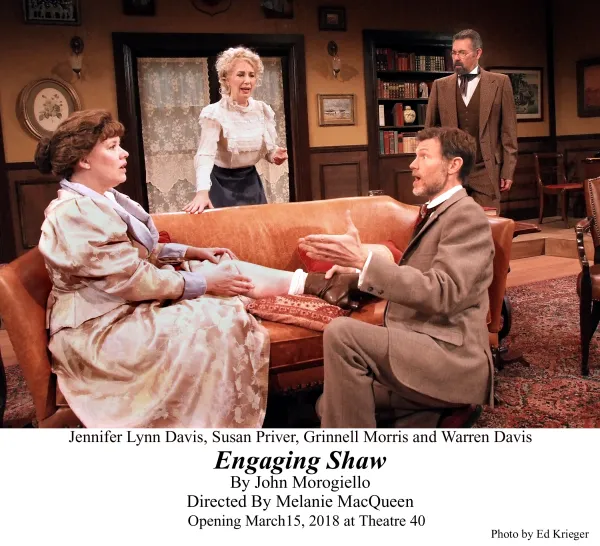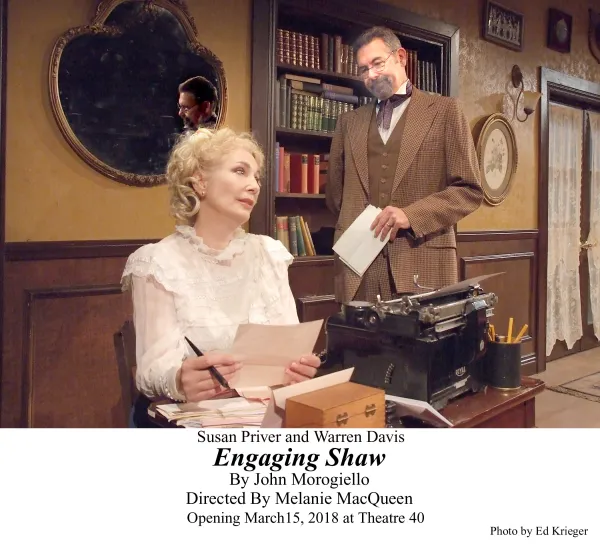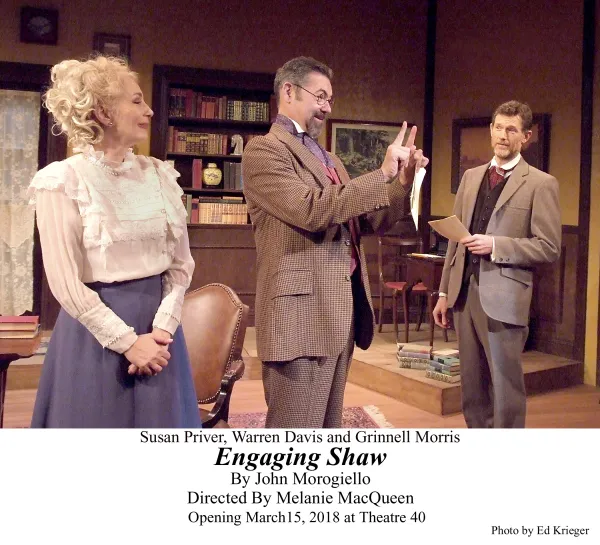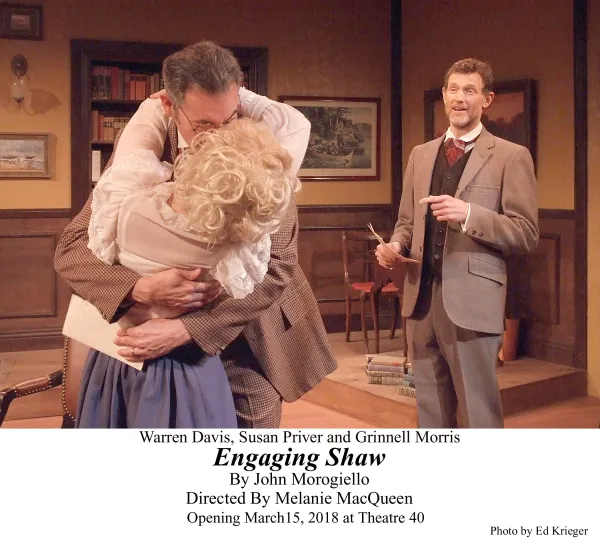In Friedrich Engels’ 1880 book Socialism: Utopian and Scientific the co-founder of communism wrote about the difference between an idealistic conception of socialism and one rooted in historical, material reality. Raoul Peck’s new movie biopic The Young Karl Marx deals with this disparity and shows how during the 1840s Marx and Engels rooted the emerging notion of socialism in the real world and class struggle. In John Morogiello’s play Engaging Shaw the dramatis personae all belong to the former decidedly fanciful, airy-fairy trend of socialistic thought - and they sure act like it.
In this four-hander all of the thesps portray actual historical figures, as is the tendency of Morogiello, whose plays often allude to real noteworthy people, such as Blame It On Beckett (as in Samuel), which was performed a few years back at the Colony Theatre, and the stellar The Consul, The Tramp, and America’s Sweetheart, which like Engaging Shaw had its West Coast premiere at Theatre 40. In addition to its title character - playwright George Bernard Shaw (Grinnell Morris), the first writer to win a Nobel Prize and an Oscar (for his screenplay of Pygmalion, the basis of My Fair Lady) - this two-acter also depicts Charlotte Payne-Townshend (Jennifer Lynn Davis) plus Beatrice and Sidney Webb (Susan Priver and Warren Davis).
Beatrice was well-endowed - hey, get yer mind out of the gutter, I’m talking financially, as she was the daughter of a British capitalist and became an heiress! She, Sidney and Shaw were early adherents of the Fabian Society - no, this was not a fan club devoted to the pop singer who appeared on Dick Clark’s American Bandstand, crooned hits such as Tiger and acted in movies such as the 1962 Jules Verne-based Five Weeks in a Balloon. Rather, the Fabian Society was a democratic socialist group that believed in reform, not revolution, and that the ballot, not the bullet, would usher in industrial egalitarianism. The Fabians used an inheritance to found the London School of Economics (speaking of rock singers, that academic institution’s most famous student is none other than Mick Jagger).
Shaw joined the Fabians and was good friends with the Webbs, which led to the striving playwright’s meeting of Charlotte, a wealthy woman who, like Shaw, was originally from Ireland (although this play takes place in Stratford, England and Fitzroy Square in London circa 1897). Charlotte also donated part of her fortune to the London School of Economics and as a generous woman of means, her support is much coveted by the Fabians, who have extremely bourgeois notions of what socialism is.
This is enough background to provide context for the relationship (or lack of) between Charlotte and Shaw that is the crux of this comedy. “Will they or won’t they?” is a common plot point for many romcoms and dramas (not to mention reality TV shows), but here this trope takes a twist. In Engaging, Shaw, the famed playwright, is described as an inveterate bachelor, a kind of Casanova, but with one crucial difference: He disdains sex and doesn’t seek to make love with his amorous pursuers. (What a catch!)
Enter Charlotte - if she sought to have sex with the abstemious Shaw, this would make for the premise of a saucy, bawdy comedy of manners (or lack of). However, despite the fact that Charlotte and Shaw pride themselves on being iconoclastic nonconformists who both eschew conventional marriage, the well-to-do Irishwoman sets out to wed - if not bed - the peculiar playwright. Marriages may evolve (or devolve) to the point where connubial bliss disappears over time, but to essentially begin a marriage (even between middle aged spouses) on the basis of its being sexless is pretty darn daft.
I know, I am passing judgment on morality during the Victorian Era from the vantage point of a 21st century ethos. But this proposition is obviously absurd and the characters of Morogiello’s albeit fact-based play come across as intolerable, tiresome twits. And their conception of socialism is extraordinarily bourgeois, with Charlotte, Shaw and the Webbs’ musings on what socialism is confined to perhaps three quickly stated definitions (“equitable distribution of income,” Shaw briefly explains at one point) in this entire two hour or so dramatization of a foursome all identified as being adherents of a school of socialist thought. (Offstage, Beatrice is credited with coining the term “collective bargaining” - although this is something Charlotte and Shaw clearly don’t do in the bedroom, so to speak.)
The Webbs appear to have sex - or “wind the clock” - once a week, whether they need to or not, and it’s suggested that Beatrice is one of Shaw’s endless admirers of the female sex. In any case, overall these characters are insufferable, sexless “socialists” who - like their toothless “gradualist” reformism - are all talk (and talk they do, with Morogiello striving mightily to approximate the wit of Shavian dialogue), and no action. They are dialectical with no materialism (ha ha ha). Shaw is captivated by Nietzsche’s notion of the “superman” - which can be interpreted as an extremely elitist idea, whereas socialism upholds the masses, not the “extraordinary” individual. The characters’ sense of socialism is so bourgeois that after about 120 minutes of listening to them, I was tempted to become an Ayn Rand acolyte of laissez faire capitalism or to join the Cato Institute.
Of course, as Engels noted in Socialism: Utopian and Scientific, there are many variant schools of thought. As portrayed in The Young Karl Marx, the romantic relationships of Engels with the Irish proletarian woman Mary Burns and Marx’s with his wife Jenny are far more natural and earthy. The psychoanalyst Wilhelm Reich tried to fuse Freud and Marx and believed the revolution would set orgasms free. This is cleverly visualized in Warren Beatty’s 1981 Reds, wherein scenes of the Russian Revolution are intercut with John Reed (Beatty) and Louise Bryant (Diane Keaton) making love, as if Lenin and Trotsky led the revolution in order to improve their sex life. (That’s mighty Bolshevik of them!)
To be fair, Shaw was a great thinker and dramatist. His brilliant, witty Major Barbara dramatized a powerful critique of the economics of militarism as an essential element of modern capitalism. Written in 1907, it preceded Rosa Luxemburg’s insightful analysis of the role of military spending in her 1913 volume The Accumulation of Capital and Pres. Eisenhower’s outgoing 1961 speech warning against the “military industrial complex,” which Shaw had foreseen more than half a century earlier in his wonderful play about a Salvation Army officer and her munitions manufacturing father.
However, Morogiello’s great, award-winning The Consul, The Tramp and America’s Sweetheart - about Georg Gyssling (Shawn Savage), Germany’s L.A. diplomat, trying to squelch Charlie Chaplin’s (Brian Stanton) making of The Great Dictator by lobbying and browbeating actress/movie mogul Mary Pickford (Melanie Chartoff of the TV sketch comedy show Friday’s) in her Hollywood office at United Artists Studio - was far superior (to use a capitalistic term) to his latest play.
Nevertheless, while Engaging Shaw may not be as dramatically and intellectually engaging as Tramp was, it is indeed well-acted. Morris’ Shaw does evince a facile wit, a gunslinger of zingers worthy of an Oscar Wilde (who, BTW, was portrayed by Scott Facher last November in Theatre 40’s production of Sherlock Holmes and the Case of the Jersey Lily, which was likewise set in Victorian London). My Yankee Doodle Dandy ears couldn’t determine whether the thesps had actual British/Irish accents or reasonable facsimiles thereof. Melanie MacQueen ably directs her ensemble and the set and costume designers - respectively, Jeff G. Rack and Michele Young - realistically conjure up Victorian England towards the end of the 19th century. But if you want to learn about socialism and sex, in the pecking order of productions, I prefer Raoul Peck’s impeccable The Young Karl Marx.
Engaging Shaw is being performed Thursdays through Saturdays at 8:00 p.m., Sundays at 2:00 p.m. through April 15 in Theatre 40 in the Reuben Cordova Theatre, 241 S. Moreno Drive, Beverly Hills, CA 90212. This is on the campus of Beverly Hills High School; there is free parking in a garage beneath the theatre. Theatre 40’s last play of the 2017-2018 season, Winnie-the-Pooh creator A.A. Milne’s romance/comedy Mr. Pim Passes By, opens May 17. For info: (310)364-0535; www.theatre40.org.
The third edition of "The Hawaii Movie and Television Book", co-authored by L.A.-based reviewer Ed Rampell, drops in April.



